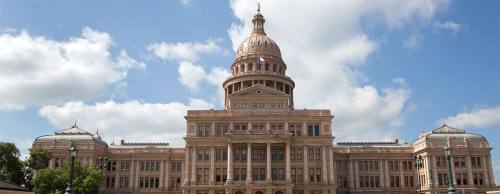Before the first day of the special session gaveled out, a House Freedom Caucus legislator asked to eliminate options for Democrats to stall special session progress. This request set the tone for the rest of the special session, which ended a day early in mid-August, with chasms widening in votes between Republicans and Democrats, between the House and the Senate, and between members of the conservative Freedom Caucus and the House Re publicans led by Speaker Joe Straus, R-San Antonio.
publicans led by Speaker Joe Straus, R-San Antonio.
On key issues, House Republicans banded together, forwarding legislation on maternal mortality, abortion reporting and mail-in ballot fraud to the governor for signing. However, they divided on issues of property tax reform and school finance.
But on the issue of school finance, the majority of the House Republicans and Democrats banded together to approve a billion-dollar infusion into the public school system, relying on money from the state’s Rainy Day Fund. The majority of Freedom Caucus members voted against this effort, but once the Senate stripped out the money from the state’s savings account, the caucus members supported the bill.
During House debate on the property tax reform bill—Senate Bill 1, Republicans disagreed on the lasting impact and scope of the bill. An added provision would have limited the bill’s power to only certain jurisdictions, incurring criticism from the Freedom Caucus for not going far enough. The caucus ultimately supported the bill, but it did not pass because the Senate did not agree to House amendments.
Lt. Gov. Dan Patrick—the Senate leader—critiqued Straus for blocking many of Gov. Greg Abbott’s key special session priorities. Freedom Caucus members appeared to agree, calling for the election of a new House speaker.
Community Impact Newspaper and The Texas Tribune have established a partnership to share summaries of new laws passed by the Texas Legislature that took effect September 1. Here is a look at some of those new laws.
Weather-related lawsuits
House Bill 1774, which went into effect Sept. 1, will discourage property owners from suing insurers over weather-related claims. Supporters want to crack down on what they characterize as an increase in frivolous lawsuits. But trial lawyers and consumer groups say legal action is often warranted and correlates with insurers denying claims.
Texting-while-driving ban
A statewide texting-while-driving ban went into effect Sept. 1. The law includes a provision to pre-empt local ordinances that govern a driver’s ability to “read, write, or send an electronic message."
Seat belts on buses
As of September, Texas school districts in the market for new school buses must ensure they have shoulder-to-lap seat belts for all riders. This three-point seat belt requirement is mandated by a new law that is intended to improve safety for riders.
Financial transactions
Beginning Sept. 1 a new law has given financial institutions in Texas greater authority to stop transactions that they suspect are aimed at defrauding elderly or disabled clients.
Health
A new law requires Texas' free-standing emergency rooms to more clearly communicate what health insurance networks they are in, if any.
Cyberbullying
A new measure, known as David’s law, aims to confront cyberbullying from multiple angles. It changes the state's education code, mandating that school districts implement cyberbullying reporting, prevention and mediation programs. It allows victims younger than age 18 to seek injunctions and restraining orders in court, and it criminalizes online harassment if it can be proven that a bully intended for a victim to hurt himself or herself.
Craft breweries
A new law requires craft brewers who produce more than 225,000 barrels a year to pay a distributor to deliver their beer—even if the destination is inside their own facility.
Community Impact Newspaper is a media partner to the 2017 Texas Tribune Festival held Sept. 22-24 on The University of Texas at Austin campus. The event will include more than 250 industry leaders and lawmakers. Learn more at texastribune.org/festival.




